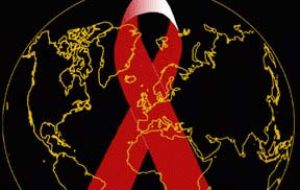MercoPress. South Atlantic News Agency
Global leaders call for end to complacency on World AIDS Day
 December 01 World AIDS Day
December 01 World AIDS Day Activists and global leaders used World AIDS Day Saturday to warn against complacency in fighting the disease and called on governments to fill a multi-billion-dollar funding gap.
"We have made tangible and remarkable progress on all these fronts. But we must do more," United Nations Secretary General Ban Ki-moon said in a message for World AIDS Day. The highlight of events across the globe was a concert in Johannesburg organised by Nelson Mandela's 46664 AIDS campaign group, named after his prison number from his 27 years in jail during South Africa's apartheid regime. An estimated 50,000 people attended the concert of local and foreign artists, ranging from Peter Gabriel to Ludacris, broadcast to millions around the world. Mandela himself put in a rare appearance, and the crowd erupted in screams before falling silent as the 89-year-old urged people to stand up and take the fight against AIDS into their own hands. "It is still alarming that for every person who receives treatment there are four others who are newly infected," said the Nobel laureate, after slowly walking to the podium with the aid of his wife and a walking stick. "Yes, big ambitious plans are needed to deal with the epidemic. But what really matters are small acts of kindness ... such as protecting yourself," he said. South Africa has the world's worst rate of HIV, according to recent UN statistics, with around 5.5 million people infected out of a population of 48 million. But while sub-Saharan Africa has been hard hit, other African nations have registered successes. Mali's HIV infection rate dropped from 1.7 percent in 2001 to 1.3 percent last year, an official from the state's national council against AIDS said. Since the first World AIDS Day in 1988 there has been progress in levelling off the percentage of the world's population living with HIV and AIDS from a peak in the late 1990s, the UN AIDS programme UNAIDS said last month. The tally of new infections fell to an estimated 2.5 million in 2007, from 3.0 million in the late 1990s, it added. Efforts to bring anti-retroviral (ARV) drugs to sub-Saharan Africa, where more than two-thirds of those with HIV/AIDS live, were now bearing fruit, it said. But with 33.2 million people around the world estimated to be living with AIDS and 2.1 million deaths in 2007, campaigners warned there was still a long way to go. "Despite substantial progress against AIDS worldwide, we are still losing ground," said James Shelton of the US Agency for International Development (USAID) in a commentary in the medical journal The Lancet on Saturday. Treatment was still only available to about 10 percent of those in need, he said, while in developing countries, "the number of new infections continues to dwarf the numbers who start anti-retroviral therapy in developing countries." One of the biggest areas of concern was funding. According to the UN, there is currently an eight-billion-dollar (five-billion-euro) shortfall in resources to fight AIDS. To meet the Group of Eight (G8) goal of providing universal access to ARVs by 2010, 42 billion dollars will be needed. So far, only 15.4 billion is in the kitty. US President George W. Bush marked the day by repeating his call on US lawmakers to double support for anti-AIDS programmes to 30 billion dollars over five years. Hillary Clinton, the Democratic frontrunner in the 2008 US presidential race, said "AIDS is not just an African problem, an Asian problem, or an American problem. It's not someone else's problem." Chinese President Hu Jintao was on front pages of state newspapers shaking the hand of a woman infected with HIV, a day after UN warnings that up to 50 million Chinese were at risk of contracting HIV/AIDS. In Australia, campaigners warned that complacency after earlier success in fighting HIV/AIDS risked giving rise to a new wave of infections. "This is the moment it all could go astray. This is the moment when it can become a pandemic," said AIDS awareness educator Vince Lovegrove. Indonesia -- which the UN says has Asia's fastest growing HIV epidemic -- marked the day with the launch of its first national campaign to promote the use of condoms. And in the Ukrainian capital Kiev, several dozen AIDS activists observed a minute of silence to remember the 12,000 Ukrainians who have died of AIDS in two decades. Some stood with their mouths taped to protest what they say is the government's silence about Ukraine's growing HIV and AIDS problem. During the first 10 months of the year, close to 14,500 new HIV cases were reported, prompting UN AIDS officials to warn that Ukraine's HIV epidemic was the most severe in Europe. French President Nicolas Sarkozy visited the country's leading HIV research hospital and called the battle against AIDS "absolutely fundamental". In Latin America, campaigns promoting condom use were in high gear particularly in Brazil, which the United Nations says is home to one third of the people infected with HIV across the region. In Peru, at least 3,000 people formed a human chain to raise awareness, while a separate exposition with "Blankets of Love," made for loved ones who dies of the disease, was held in a Lima park. In Haiti, the country with the greatest number of HIV infected people in the Americas (190,000) after Brazil, despite a relatively small population, HIV clinics were opened in the impoverished Caribbean country's capital.




Top Comments
Disclaimer & comment rulesCommenting for this story is now closed.
If you have a Facebook account, become a fan and comment on our Facebook Page!